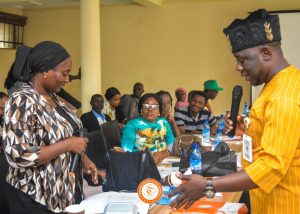The Oyo State Government, in collaboration with the United Nations Children’s Fund (UNICEF) and Trailblazer Initiative Nigeria (TBI), has launched renewed efforts to eradicate Female Genital Mutilation (FGM), Gender-Based Violence (GBV), and Violence Against Children (VAC) through advocacy, empowerment, and strengthened justice systems.



This was the focus of a one-day Law and Policy Advocacy Meeting held on Tuesday, August 26, 2025, at the Ministry of Women Affairs and Social Inclusion Conference Hall, Secretariat, Ibadan which brought together stakeholders from law enforcement agencies, the judiciary, civil society, and community groups to deliberate on practical strategies to end harmful practices and protect survivors.
Speaking at the meeting, the Commissioner for Women Affairs and Social Inclusion, Hon. (Mrs.) Toyin Balogun, stressed the urgent need for stronger enforcement of existing laws, while also highlighting government’s commitment to rehabilitating former traditional circumcisers through vocational training and sustainable empowerment.

“We cannot build something on nothing. Many of these practitioners inherited the act from their parents and relied on it for livelihood. Without sustainable alternatives, they may be tempted to return. That is why empowerment after training is crucial,” she said.


The Commissioner also emphasized that boys, as well as girls, are vulnerable to abuse and must be included in interventions. While reaffirming Governor Seyi Makinde’s commitment to building stronger institutional frameworks that prioritize survivor-centered legal aid and ensure that the justice system is both compassionate and efficient.
UNICEF Child Protection Specialist, Mr. Denis Onoise, described FGM as a form of gender-based violence rooted in harmful cultural norms. He reiterated UNICEF’s zero-tolerance stance, stressing that the law must take its course against perpetrators.
“We don’t want any child to be cut. The law is clear: nobody should be cut. If anyone continues this practice, the VAPP Law must take its course. Together, we must end FGM by 2030,” he declared.
In his remark, the executive director of TBI, Dr. Dare Olagoke Adaramoye, explained that the programme was designed to strengthen prosecution, bridge justice gaps, and improve survivor-centered support services.
Findings presented at the meeting showed that FGM persists due to cultural beliefs, low awareness of laws, stigma, weak community-law enforcement linkages, and even medicalization of the practice by some health workers.
Stakeholders identified several challenges affecting justice delivery, including inadequate funding for witnesses, shortage of judges, lack of shelters and Sexual Assault Referral Centres (SARCs), and poor inter-sectoral collaboration.
At the close of meeting, participants adopted key resolutions such as: establishing specialized courts for GBV/FGM cases, recruiting more judges, expanding family courts, improving survivor-centered legal aid, scaling up shelters and SARCs, continuous community sensitization on the VAPP Law, and providing sustainable empowerment for former circumcisers.
The meeting ended with a collective resolve by stakeholders including the Oyo State House of Assembly, Ministry of Justice, FIDA, National Human Rights Commission, and law enforcement agencies that FGM, GBV, and VAC are crimes against the state and must be addressed with urgency.
“Protecting our girls is not just a duty but a collective responsibility. FGM, GBV, and VAC are battles we must all fight together.”

